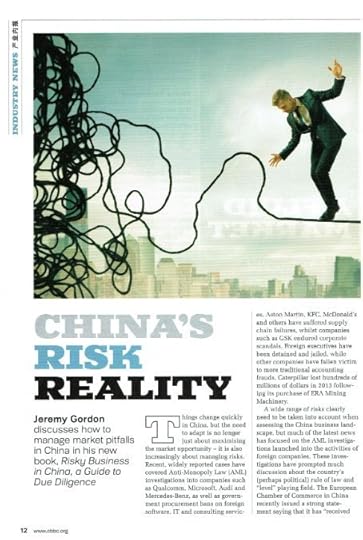Jeremy Gordon: China's Risk Reality

Things can change quickly in China, but the need to adapt is no longer just about maximising the market opportunity – it is also increasingly about managing risks. Recent, widely reported cases have covered Anti-Monopoly Law (AML) investigations into companies such as Qualcomm, Microsoft, Audi and Mercedes-Benz, as well as government procurement bans on foreign software, IT and consulting services. Aston Martin, KFC, McDonald’s and others have suffered supply chain failures, whilst companies such as GSK endured corporate scandals. Foreign executives have been detained and jailed, while other companies have fallen victim to more traditional accounting frauds. Caterpillar lost hundreds of millions of dollars in 2013 following its purchase of ERA Mining Machinery.
A wide range of risks clearly need to be taken into account when assessing the China business landscape, but much of the latest news has been focused on the AML investigations that have been launched into the activities of foreign companies. These investigations have prompted much discussion about the country's (perhaps political) rule of law and “level” playing field. The European Chamber of Commerce in China recently issued a strong statement saying that it has “received numerous alarming anecdotal accounts from a number of sectors that administrative intimidation tactics are being used to impel companies to accept punishments and remedies without full hearings…the European business community is also increasingly considering the question of whether foreign companies are being disproportionately targeted in the investigations”.
The AML and other challenges for foreign firms operating in China have not appeared out of the blue, and attitudes to foreign investment have been changing for some time. In 2006 Li Deshui, then head of the National Bureau of Statistics warned of the risk to Chinese brands of “malicious acquisitions” by multinationals. In 2010 Jeffrey Immelt, the CEO of General Electric, noted: “It’s getting harder for foreign companies to do business [in China]…I am not sure that in the end they want any of us to win, or any of us to be successful.” While the challenges are not new, they do need to be seen in a new context that includes slower economic growth, rising costs, a focus on the domestic market over investment and exports, indigenous innovation, greater competition, the anti-corruption campaign, development of the rule of law, and increased official and media scrutiny of foreign companies. In this environment it is much harder to achieve targets - and to hide problems that might previously have been papered over with news of more profits.
Some companies share Jeffrey Immelt’s pessimistic view. An extreme case is that of the pharmaceutical company Actavis, which announced it was pulling out in early 2014, as “China is just too risky”. That announcement came in the aftermath of the 2013 GSK bribery scandal, which resulted in charges being brought against a senior British executive, jail for two foreign investigators, a reported 61 percent drop in sales for the company - and now a fine of hundreds of millions of pounds. But for most the China market is too important to ignore, either because it hosts the industrial clusters and logistical infrastructure that feed the global supply chain, or because the potential market is so huge. A reliance on China for both supply and demand creates additional risk, and puts some in an increasingly uncomfortable position between the proverbial rock and a hard place.
As I write in my book Risky Business in China: “Fundamental political, economic and social shifts have changed the nature of the opportunities and risks…Foreign companies operating in China need to undergo a full review of risks in order to protect themselves from official scrutiny and the higher standards to which they are held. They also need to sustainably localise their business models in order to become part of the fabric of Chinese society, and valuable corporate citizens…They should take long-term, protective measures that move beyond compliance processes and box-ticking due diligence, to incorporate a balanced approach to practical, on-going risk management, and to sustainable values and business models”.
International businesses need an awareness of policy and regulatory risk, proactive (and regular) due diligence, and alignment of compliance policies with corporate targets and rewards to survive in this new environment. Companies also need new strategies, some of which have already been seen. For example, Tesco has moved away from developing its own business in China, and opted for a minority stake in a joint venture with state-owned China Resources Enterprises. 3M, has localised its business units, management and products, to “play as a local”, while Weetabix has avoided the challenge of foreign market entry by becoming Chinese when it was bought by Bright Foods.
As I conclude in the book: “Huge opportunities remain in China, but international businesses cannot afford to ignore the macro risks presented by changing regulatory and market forces. The Chinese leadership has set its course and is unlikely to change direction, so the exposure to risky business in China will only increase for those that do not take steps to align with the new reality”.
Jeremy Gordon is a director of China Business Services and China Edge, and is the author of “Risky Business in China, a Guide to Due Diligence” (Palgrave, September 2014).
Jeremy will be speaking about business risk in China at Chatham House on 23 October.
This article originally appeared in the October 2014 edition of China-Britain Business Focus, the magazine of the China-Britain Business Council and the British Chamber of Commerce in China.
Risky Business In China
- Jeremy Gordon's profile
- 13 followers



